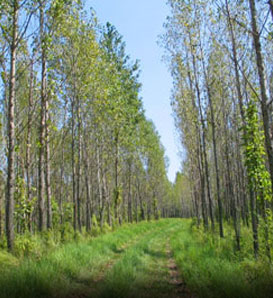Hybrid Poplar Tree Biography
Hybrid poplar, a fast growing energy plantation crop is among those plants that offer high energy biomass and incredible improvements on greenhouse gas emissions. While biomass energy fuels of high energy composition are key, some of them while obtained from the biosphere are not as good at reducing our carbon footprint as others. Interestingly enough, those crops that are not replanted each year are far more beneficial to Earth and its inhabitants, driving the point that ‘speed kills’ home with clarity.
It isn’t just the plant involved; the constant tilling of soil is also a component in getting a handle on our greenhouse emissions issue. Biomass energy using annual plants like corn and soybeans require fresh tilling and reseeding each and every season. There are better answers to the problems at hand, especially in light of the fact that it has been noted by the DOE that 30% of the fossil fuel use in the USA is connected to food crops being used for production and delivery of biofuels. Corn and soybeans do not grow in just any region and, in many instances, must be hauled a long ways to supply all 50 states.
In 2007, surprising research results were released from a Purdue University study conducted to assess the fluxes of greenhouse gas and biomass yields for corn, soybeans, alfalfa, reed canary grass, switch grass and hybrid poplar. Comparisons of gas and diesel along with ethanol and biodiesel produced from corn and soybeans did reduce fossil fuel emissions by close to 40%. This does not sound very remarkable at all when the results reveal that reed canary grass reduced fuel emissions by 85%.
If you think that is better, then consider the knowledge that greenhouse gas emissions can be reduced far more than that with ethanol made from switch grass and hybrid poplar biomass to a whopping 115% reduction. Additionally, for the generation of electricity from biomass gasification, poplar proved to offset fossil fuels emissions by twice as much. Because hybrid poplar plantations are no-till crops for 7 years at minimum they greatly reduce soil carbon sequestration where our farmland is absorbing carbon from the atmosphere. This in turn decreases the life and quality of productive soils and nitrogen emissions from annually tilled soil is one of our greenhouse gas emission issues not often mentioned.
Hybrid poplar, a fast growing energy plantation crop is among those plants that offer high energy biomass and incredible improvements on greenhouse gas emissions. While biomass energy fuels of high energy composition are key, some of them while obtained from the biosphere are not as good at reducing our carbon footprint as others. Interestingly enough, those crops that are not replanted each year are far more beneficial to Earth and its inhabitants, driving the point that ‘speed kills’ home with clarity.
It isn’t just the plant involved; the constant tilling of soil is also a component in getting a handle on our greenhouse emissions issue. Biomass energy using annual plants like corn and soybeans require fresh tilling and reseeding each and every season. There are better answers to the problems at hand, especially in light of the fact that it has been noted by the DOE that 30% of the fossil fuel use in the USA is connected to food crops being used for production and delivery of biofuels. Corn and soybeans do not grow in just any region and, in many instances, must be hauled a long ways to supply all 50 states.
In 2007, surprising research results were released from a Purdue University study conducted to assess the fluxes of greenhouse gas and biomass yields for corn, soybeans, alfalfa, reed canary grass, switch grass and hybrid poplar. Comparisons of gas and diesel along with ethanol and biodiesel produced from corn and soybeans did reduce fossil fuel emissions by close to 40%. This does not sound very remarkable at all when the results reveal that reed canary grass reduced fuel emissions by 85%.
If you think that is better, then consider the knowledge that greenhouse gas emissions can be reduced far more than that with ethanol made from switch grass and hybrid poplar biomass to a whopping 115% reduction. Additionally, for the generation of electricity from biomass gasification, poplar proved to offset fossil fuels emissions by twice as much. Because hybrid poplar plantations are no-till crops for 7 years at minimum they greatly reduce soil carbon sequestration where our farmland is absorbing carbon from the atmosphere. This in turn decreases the life and quality of productive soils and nitrogen emissions from annually tilled soil is one of our greenhouse gas emission issues not often mentioned.
Hybrid Poplar Tree
Hybrid Poplar Tree
Hybrid Poplar Tree
Hybrid Poplar Tree
Hybrid Poplar Tree
Hybrid Poplar Tree
Hybrid Poplar Tree
Hybrid Poplar Tree
Hybrid Poplar Time Lapse - 1 month
Tree Removal Hybrid Poplar 50' TALL








No comments:
Post a Comment